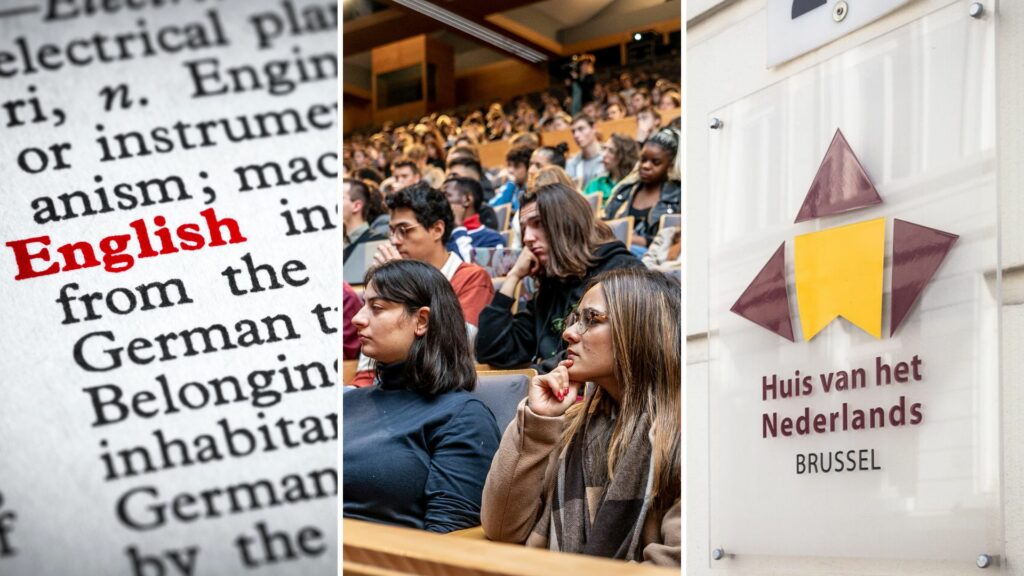With yesterday's brief dedicated to the turns of phrase that escape logical explanation, language is again today's talking point as the Flemish Minister of Education caused a stir by blocking proposals for university courses that would run purely in English. The rejection came as a shock to institutions used to government approval for courses that respond to economic exigencies.
Flanders has a number of internationally-recognised universities and understands the real value of training not only regional residents but also attracting students from overseas. Ever eager to position itself at the centre of growing sectors that can ensure long-term prosperity, Flemish authorities recognise the need for education to be forward-thinking.
Undeniably, part of the region's lure to investors is the language capabilities of residents. Flanders looks beyond its immediate Dutch neighbours for business partners and the general proficiency in English makes this so much easier. In response to this reality, universities had come up with a number of English-only courses – often technical – that they believed would produce a workforce that can compete in global job markets and also would appeal to participants from elsewhere.
With the ministerial seal of approval normally a final formality, they were surprised when their proposals were met with a resounding rejection. Could this be another example of the region's politicians harbouring a cultural conservatism? The government requirement for equivalent courses to be offered in Dutch does have an air of protectionism and frustrated rectors put forward a persuasive case that the Dutch programmes have dwindling applicants and create a great amount more work for professors.
Are the region's educators victims of political ideals? Whilst it might appear that ministers are resisting the tide of the times, they also make an argument that, though more emotional, is nonetheless compelling. In the words of the education minister: "It took a very long time for Dutch to be accepted as a fully-fledged language of education, a scientific language, an academic language. We mustn't throw that away now."
As I explained yesterday, linguistic plurality brings a refreshing variety and depth that make possible experiences and learning opportunities that would be limited by a homogenous lingua franca. Isn't there a rather noble charm in championing the pillars that preserve local identity? How much effort can we reasonably expend in assuring a language's longevity?
Let @Orlando_tbt know.
Belgium in Brief is a free daily roundup of the top stories to get you through your coffee break conversations. To receive it straight to your inbox every day, sign up below:
1. National strike: What public transport disruptions to expect today
Following a week marked by travel chaos and protest actions, Belgium's main trade unions are organising a nationwide strike on Friday to highlight the importance of investing in public services. Public transport disruptions are expected throughout the day. Read more.
2. Flanders puts brakes on Anglicisation of master's degrees
The regional education minister for Flanders Ben Weyts has made an unprecedented move to refuse a package of applications for English-language courses in an effort to "preserve Dutch-language education." Read more.
3. What to do in Brussels this weekend: 10 – 12 March
Despite it being March and spring being around the corner, it seems unlikely that the skies over Belgium will clear anytime soon. The temptation to stay indoors with blankets and comfort food is strong. Read more.
4. All Belgian governments ban use of TikTok on staff devices
All of Belgium's Governments will now ban the use of the Chinese social media app TikTok on staff members' computers and mobile phones. Read more.
5. Putting Belgian CO2 in the ground: Project Greensand launches
Carbon capture is a much-discussed topic among climate engineers though in practice is a complex process that can often be energy-intensive itself. Yet given the right conditions it can be viable. One such example is Project Greensand, which will store CO2 in the subsoil of the North Sea. Read more.
6. 10 unusual facts about European languages you didn't know
From French to Estonian, our continent features many beautiful and unique languages. There is a European language for those who want an adventure and those looking for a challenge. Here is a rundown of exciting facts you may have not known about languages in Europe. Read more.
7. Hidden Belgium: Fripon
Hotel restaurants are becoming trendy local spots to eat out in Brussels. The Jam Hotel serves Asian street food. The Moxy has a Belgian menu. And the vintage hotel Le Berger draws a mix of locals and tourists to its relaunched and renamed restaurant Fripon. Read more.


